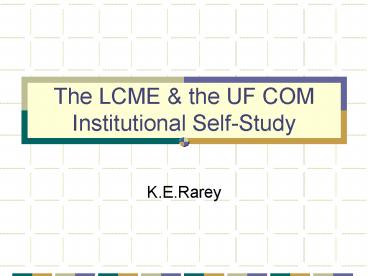The LCME PowerPoint PPT Presentation
1 / 14
Title: The LCME
1
The LCME the UF COM Institutional Self-Study
- K.E.Rarey
2
Liaison Committee on Medical Education (LCME)
- http//www.lcme.org
- http//www.med.ufl.edu/oea/opfd/program/lcme_summa
ry.shtml
3
Calendar for UF COM Self-Study LCME Site Visit
18 Month Process Site Visit February 18-21,
2007
4
D. Curriculum Management1. Roles and
Responsibilities
- ED-33. There must be integrated institutional
responsibility for the overall design,
management, and evaluation of a coherent and
coordinated curriculum.
5
The phrase "integrated institutional
responsibility" implies that an institutional
body (commonly a curriculum committee) will
oversee the educational program as a whole. An
effective central curriculum authority will
exhibit -- Faculty, student, and administrative
participation.-- Expertise in curricular design,
pedagogy, and evaluation methods.-- Empowerment,
through bylaws or decanal mandate, to work in the
best interests of the institution without regard
for parochial or political influences, or
departmental pressures.
6
The phrase "coherent and coordinated curriculum"
implies that the program as a whole will be
designed to achieve the school's overall
educational objectives. Evidence of coherence and
coordination includes --Logical sequencing of
the various segments of the curriculum.--
Content that is coordinated and integrated within
and across the academic periods of study
(horizontal and vertical integration).-- Methods
of pedagogy and student evaluation that are
appropriate for the achievement of the school's
educational objectives.
7
Curriculum management signifies leading,
directing, coordinating, controlling, planning,
evaluating, and reporting. Evidence of effective
curriculum management includes -- Evaluation of
program effectiveness by outcomes analysis, using
national norms of accomplishment as a frame of
reference.-- Monitoring of content and workload
in each discipline, including the identification
of omissions and unwanted redundancies.-- Review
of the stated objectives of individual courses
and clerkships, as well as methods of pedagogy
and student evaluation, to assure congruence with
institutional educational objectives.
8
Minutes of the curriculum committee meetings and
reports to the faculty governance and deans
should document that such activities take place
and should show the committee's findings and
recommendations.
9
- ED-34. The program's faculty must be responsible
for the detailed design and implementation of the
components of the curriculum. - Such responsibilities include, at a minimum, the
development of specific course or clerkship
objectives, selection of pedagogical and
evaluation methods appropriate for the
achievement of those objectives, ongoing review
and updating of content, and assessment of course
and teacher quality.
10
- ED-35. The objectives, content, and pedagogy of
each segment of the curriculum, as well as for
the curriculum as a whole, must be subject to
periodic review and revision by the faculty.
11
- ED-37. The faculty committee responsible for the
curriculum must monitor the content provided in
each discipline so that the school's educational
objectives will be achieved. - The committee, working in conjunction with the
chief academic officer, should assure that each
academic period of the curriculum maintains
common standards for content. Such standards
should address the depth and breadth of knowledge
required for a general professional education,
currency and relevance of content, and the extent
of redundancy needed to reinforce learning of
complex topics. The final year should complement
and supplement the curriculum so that each
student will acquire appropriate competence in
general medical care regardless of subsequent
career specialty.
12
- ED-38. The committee responsible for the
curriculum, along with medical school
administration and educational program
leadership, must develop and implement policies
regarding the amount of time students spend in
required activities, including the total required
hours spent in clinical and educational
activities during clinical clerkships. Technical
revision approved June 2005, effectively
immediately. - Attention should be paid to the time commitment
required of medical students, especially during
the clinical years. Students' hours should be set
taking into account the effects of fatigue and
sleep deprivation on learning, clinical
activities, and student health and safety.
Annotation revised June 2005.
13
(No Transcript)
14
ED-24. Residents who supervise or teach medical
students, as well as graduate students and
postdoctoral fellows in the biomedical sciences
who serve as teachers or teaching assistants,
must be familiar with the educational objectives
of the course or clerkship and be prepared for
their roles in teaching and evaluation. The
minimum expectations for achieving compliance
with this standard are that (a) residents and
other instructors who do not hold faculty ranks
(such as graduate students and postdoctoral
fellows) should receive a written copy of the
course/clerkship objectives and clear guidance
from the course/clerkship director about their
roles in teaching and evaluating medical
students and (b) that the institution and/or
relevant departments provide resources such as
workshops/written materials to enhance the
teaching and evaluation skills of residents and
other non-faculty instructors. There should be
central monitoring of the level of resident/other
instructor participation in activities to enhance
their teaching/evaluation skills. The LCME
encourages formal assessment of the teaching and
evaluation skills of residents and other
non-faculty instructors, with opportunities
provided for remediation if their performance is
inadequate. Assessment methods could include
direct observation by faculty, feedback from
students through course/clerkship evaluations or
focus groups, or any other suitable method. New
annotation approved February 2005.

